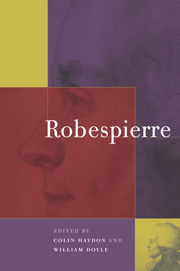Book contents
- Frontmatter
- Contents
- List of contributors
- Acknowledgements
- List of abbreviations
- Part I Introduction
- Part II Robespierre's outlook
- Part III Robespierre's politics
- Part IV Robespierre in retrospect
- 11 Carlyle's seagreen Robespierre and the perilous delights of picturesque history
- 12 Robespierre through the Chartist looking-glass
- 13 Rehabilitating Robespierre: Albert Mathiez and Georges Lefebvre as defenders of the Incorruptible
- 14 Robespierre in French fiction
- 15 The representation of Robespierre in European drama
- Part V Conclusion
- Index
15 - The representation of Robespierre in European drama
Published online by Cambridge University Press: 14 January 2010
- Frontmatter
- Contents
- List of contributors
- Acknowledgements
- List of abbreviations
- Part I Introduction
- Part II Robespierre's outlook
- Part III Robespierre's politics
- Part IV Robespierre in retrospect
- 11 Carlyle's seagreen Robespierre and the perilous delights of picturesque history
- 12 Robespierre through the Chartist looking-glass
- 13 Rehabilitating Robespierre: Albert Mathiez and Georges Lefebvre as defenders of the Incorruptible
- 14 Robespierre in French fiction
- 15 The representation of Robespierre in European drama
- Part V Conclusion
- Index
Summary
In many plays concerned with the French Revolution, the clash between the two great leaders, Danton and Robespierre, constitutes a major theme. This is inevitable, given the obvious dramatic potential of the opposition of these figures who imposed their personalities on the events of the time, and have fascinated the imagination of historians and creative writers over the two centuries since those events took place. And it cannot be denied that of the two, it is Danton who has appealed more often to the creative imagination, as a larger-than-life, almost mythic example of the tragic hero; Büchner's Dantons Tod is no doubt the best-known, but is by no means the only, example of such an interpretation, in which the hero is destroyed by a fatal flaw within himself as much as by the historical forces of the times in which he lived. Such an interpretation almost inevitably requires the identification of Robespierre with these historical forces, as a functional agent, or catalyst, for the destruction of the tragic protagonist, the irony of his own death forming at best a sort of epilogue. Saint-Georges de Bouhelier, whose play Le sang de Danton was performed at the Comedie-Francaise in 1931, wrote, ‘It is not a historical drama in the conventional meaning of the term. It is a tragedy in the mould of the Oresteia or Oedipus Rex.’
- Type
- Chapter
- Information
- Robespierre , pp. 237 - 252Publisher: Cambridge University PressPrint publication year: 1999



